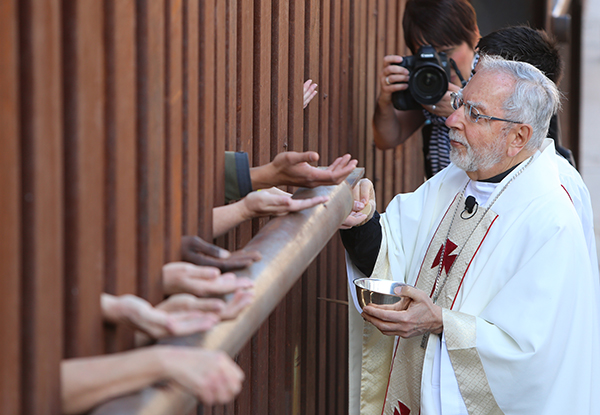
Cardinal Sean O’Malley of Boston and seven other bishops celebrate Mass on the U.S.-Mexico border in Arizona to commemorate the deaths of migrants in the desert and to pray for immigration reform on April 1, 2014.
PHOENIX — Several Arizona churches are preparing to offer refuge to Central American migrants after the Department of Homeland Security launched an effort over the weekend to round up and deport adults and children who entered the country illegally and remained after they had been ordered by a judge to leave.
Immigration officials said 121 adults and children were taken into custody. They all had remained in the country after being ordered by a judge to leave. Many were already in the process of being deported as part of the enforcement operation, which mostly took place in Georgia, Texas and North Carolina.
The enforcement operations did not include any Central Americans living in Arizona, said Yasmeen Pitts O’Keefe, an Immigration and Customs Enforcement spokeswoman.
The roundups also did not include the thousands of children from Central America who traveled alone to the United States during a massive migration in 2014.
RELATED STORY: Pope Francis expected to visit US-Mexico border in February, adviser says
O’Keefe would not comment on whether ICE was planning to conduct more efforts to find and deport Central Americans either in Arizona or other states.
But several Arizona churches are considering or have already announced plans to offer sanctuary to Central Americans facing deportation, said the Rev. Noel Andersen, national grass-roots coordinator for Church World Service, an interfaith coalition. They are among dozens of congregations nationwide mobilizing to either to open their doors to Central Americans or offer their support, he said.
“We’re seeing a real united front in the faith community that these raids are immoral, that we should not be targeting people who have fled violence, who will be sent back to perhaps a violent situation that could be fatal,” Andersen said.
Shadow Rock United Church of Christ in Phoenix is considering opening its doors to offer sanctuary to Central American families facing deportation, said the Rev. Ken Heintzelman, the head pastor.
The same church offered sanctuary in November 2014 to Eleazar Misheal Perez Cabrera a day before the Guatemalan immigrant was supposed to voluntarily leave the country after a judge issued an deportation order. Perez Cabrera lived inside the church for 110 days until he was granted a one-year reprieve allowing him to remain in the country under ICE supervision.
The congregation, Heintzelman said, believes it has a moral obligation to protect Central Americans fleeing violence.
“Migration is a natural human phenomenon that when people are hungry they move where the food is, when they are thirsty, they move where the water is and where there is violence, they move away from the violence,” the pastor said. “What we have done with our laws is we have criminalized a natural human phenomenon, and that is wrong. That’s immoral.”
RELATED STORY: Churches settling refugees against governors’ wishes
The South Side Presbyterian Church in Tucson, which pioneered the original movement offering sanctuary to Central Americans fleeing civil war in the 1980s, is also prepared to open its doors to Central American families facing deportation.
“As pastors we know that each and every family is a holy family and the individuals and families who have fled violence don’t just need our prayers, they need sanctuary,” the Rev. Alison Harrington said in an earlier statement.
At least three other churches in the Valley also have already opened their doors to immigrants facing deportation, Andersen said.
DHS Secretary Jeh Johnson said in a statement released Monday that the operation to find and deport Central Americans launched over the weekend “should come as no surprise.”
“I have said publicly for months that individuals who constitute enforcement priorities, including families and unaccompanied children, will be removed,” Johnson said.
He said those targeted for removal over the weekend were adults and children who were apprehended crossing the border illegally after May 1, 2014, and had been issued final orders of removal by an immigration judge. They also had “exhausted appropriate legal remedies” and had no outstanding appeal or claim for asylum or humanitarian relief under the law, Johnson said.
RELATED STORY: Jesuits tell their alumni in Congress: Protect border children
Salvador Ongaro, a Phoenix immigration lawyer, said he believes most of the Central Americans targeted over the weekend had been ordered deported “in absentia.” That means they didn’t appear for court hearings and that is why a judge had issued a removal order.
Typically, asylum cases can take several years to be finalized; all of the families taken into custody arrived after May 1, 2014.
He said migrants ordered deported can apply to have their cases reopened if they were ordered deported in absentia. They have a “good chance” of having their cases reopened, especially if they did not receive notice of their hearing, he said.
(Daniel González reported this story for The Arizona Republic)





